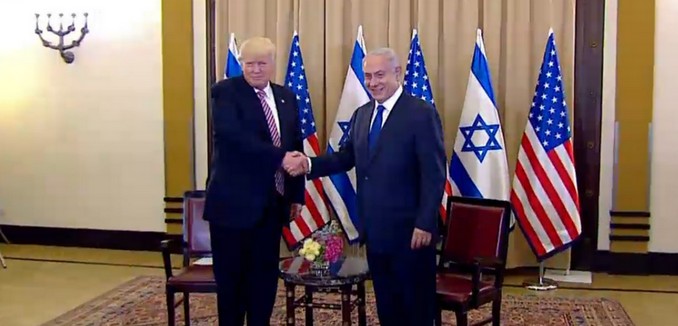President Donald Trump said in a meeting with Israeli Prime Minister Benjamin Netanyahu on Monday that the nuclear deal emboldened Iran to continue its destabilizing actions across the Middle East.
Speaking to Netanyahu in Jerusalem, Trump said that he saw a “deeper path to friendship” in the Arab world, which he attributed to Iran’s growing influence in the Middle East since the 2015 nuclear deal.
Netanyahu concurred, adding that the strong stance the White House has taken on Iran “helps propel the possibility of reconciliation and peace between Israel and the Arab world.”
“No matter where we go we see the signs of Iran in the Middle East. No matter where we go, whether it’s Syria, where we were forced to shoot the fifty nine missiles,” Trump continued, referring to an American cruise missile strike on a Syrian airbase following a lethal Syrian chemical weapons attack on civilians in April.
“No matter what area we’re in,” the president added, “Yemen, Iraq, no matter where we are, we see the signs, every sign, whether it’s soldiers, whether it’s money and guns, it’s Iran. Instead of saying ‘thank you’ to the United States, they now feel emboldened.”
“Iran will never have a nuclear weapon,” Trump concluded emphatically. “That I can tell you.”
Trump’s remarks suggest that he will actively fight Iran’s influence in the Middle East.
Josh Rogin, national security columnist for The Washington Post, called on the U.S. on Sunday to prevent Iran and its allies from establishing a zone of influence in southern Syria, which would threaten moderate rebels in the region and Israel.
Noting with approval that U.S. forces targeted a convoy of pro-Assad forces last week, Rogin observed that Iran was still attempting to “establish strategic control over territory creating a corridor from Lebanon and Syria through Baghdad to Tehran.”
If Iran would succeed in doing so, Rogin assessed, it would “harm the fight against the Islamic State in the nearby city of Deir al-Zour and directly undermine U.S. efforts to train and equip an indigenous Sunni Arab fighting force, which is essential to establishing long-term stability.”
“The battle for Syria’s south is on, and the Trump team must decide if the United States will play a decisive role,” Rogin concluded. “Trump could fulfill his promises to thwart Iran and bring greater stability to Syria — if he acts fast.”
[Photo: Government Press Office ]




